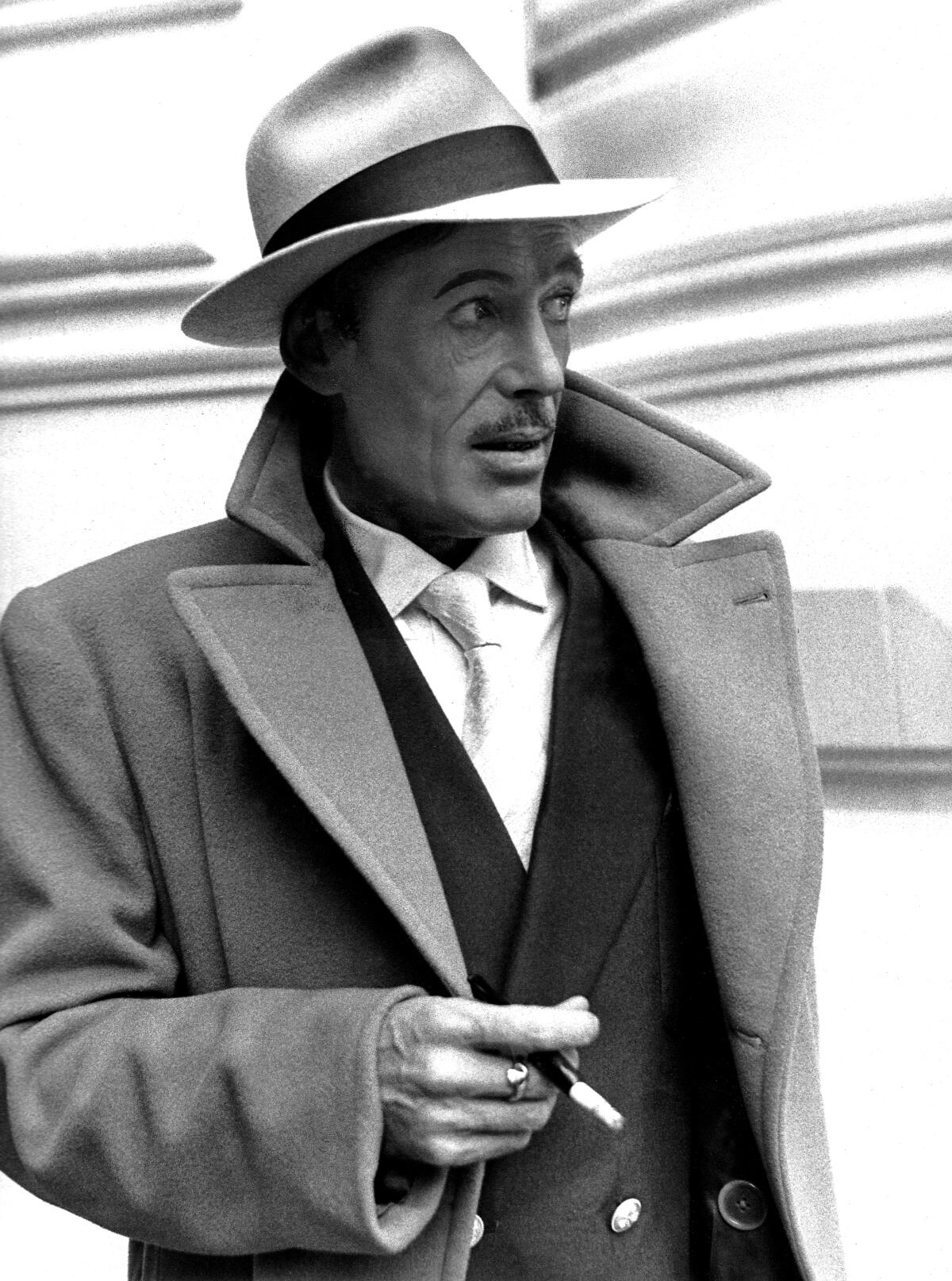From the Archives: Movie review: ‘My Favorite Year’: A Fun Trip Back to 1954

- Share via
Television in 1954 was a gorgeous grab bag. Reach in and you’d get Sid Caesar and Imogene Coca on “Your Show of Shows,” or the almost unbelievable goings-on at the Army-McCarthy hearings. You might hit “Playhouse 90” or “Dollar a Second,” Edward R. Murrow or Ernie Kovacs.
In the effervescent “My Favorite Year“ Benjy Stone (newcomer Mark Linn-Baker), the most junior writer on “The Comedy Cavalcade,” finds it the best of all possible years. Never mind that his toehold on the ladder of success brings him to the coffee shop schlepping for others more often than to the show’s story conferences. He’s already come miles from Ocean Parkway, from Brooklyn College and from his mother (Lainie Kazan). He’s working for King Kaiser (Joseph Bologna), reigning television comic. And Benjy’s idol, the Errol Flynn-like Alan Swann (Peter O’Toole), joins the show for a parody of “The Three Musketeers” this very week.
If he stays sober long enough to pronounce his words. Swann already has arrived in New York, swathed in enough cashmere suiting to stock all Bond Street, and entirely the worse for wear.
Kaiser, who carries a wallet where other people stow their hearts, is all for junking him instantly. Benjy puts in an impassioned plea for his hero — over Swann’s unconscious body — and wins him one last chance. But Benjy is to be his duenna and the show is a week away.
And there is one last problem. King Kaiser has been convulsing “Comedy Cavalcade” audiences with a merciless impersonation of a heavy-duty labor leader/hood. Boss Rojeck (Cameron Mitchell). Appearing at the television studio in person, tempered by his unctuous lawyer (“We’ll all be sitting down now, Mr. Rojeck”), Rojeck leaves no doubt that crossing him is not safe.
On this framework, writers Norman Steinberg and Dennis Palumbo, working from Palumbo’s story, and Richard Benjamin, making his directing debut, have hung an engaging film whose strongest points are O’Toole’s elegant, rueful comic performance, and the film’s artful re-creation of the manic live days of television.
On the “Cavalcade’s” inner circle are its writers, two of whom, Bill Macy and Basil Hoffman, speak to each other through the group’s only female comedy writer, Anne De Salvo (last seen as the hooker Arthur takes to the Plaza in “Arthur”). Working away downstairs, ironing cigarette ash into every costume, is the splendid Selma Diamond. And the harassed object of Benjy’s affection is Jessica Harper, the show’s production assistant.
If the backstage television glimpses seem true, from the prancing chorus girls to Kaiser’s absent-minded panic at which number to suit up for, it should. Screenwriter Steinberg is an Emmy-winning television comedy writer, his collaborator, Palumbo, has both written and edited television and the producing company is Mel Brooks’ Brooksfilms Ltd. (with Michael Gruskoff).
The performances split right down the middle. There is an overeager, pressing quality to many of them. Director Benjamin has allowed young Mark Linn-Baker to overact and mug ferociously, and Jessica Harper seems tensed up and stagy, her face screwed up into overbrightness.
Yet with all this, Benjy isn’t a thoroughgoing pain. He is the prototypical cut-up, the funniest kid in high school, with an advanced sense of irony. Yet, somewhere down the line, when a little success comes his way you feel that Benjy probably will be just fine.
As the watchful, knowing comedy writer, Anne De Salvo is an anchor in the storm around her, as is Tony DiBenedetto as Swann’s resourceful and loyal chauffeur. On the other hand, there is no restraint whatever to Adolph Green’s performance as King Kaiser’s producer.
However, Cameron Mitchell’s Boss Rojeck, Bologna’s King Kaiser and OToole’s Swann are superb. Rojeck’s head appears to be set firmly on a fireplug neck; his voice is a series of animal growls. His scene with Kaiser is one of the film’s best-timed sequences.
King Kaiser is not an uncomplicated character. He has almost no way of relating to others around him other than by bullying them and then buying them back. But if he is crude, it is Sid Caesar crude, not Uncle Millie crude. He is foolishly brave, partly because he is a big, fearless man and partly because he doesn’t honestly believe anyone would dare hurt him. As played by Bologna, he is handsome, deft and vastly funny.
Yet it is O’Toole who makes the most lasting impression as a man who never can escape his own reputation. Whether riding up to his hotel room, strapped to a luggage cart like an obliging department store mannequin, or casing the Stork Club with radar that takes note of the most luscious girl there in one imperceptible flick of his eye. O’Toole makes Swann elegantly self-knowing.
His most telling line is not “I’m not an actor. I’m a movie star.” It’s his softer rumination on the twin bedevilments, attraction and reputation. Every woman makes straight for him because of his well-deserved celebrity as a Lothario; yet, as Swann is only too well aware, “No matter what I do, I can never fulfill their expectations.”
“My Favorite Year” is best when it doesn’t push quite so hard and doesn’t take its moral lessons quite so earnestly. It’s a gentle, often very funny film about a year and a decade that many remember in a flood of affection.


